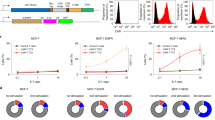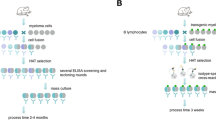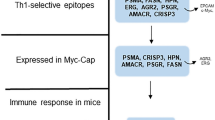Abstract
Six different immunisation regimes have been used to generate spleen cells with reactivity against human pancreatic exocrine cancer. Immunised spleen cells were fused with an NSO/1 myeloma line and supernatants from these hybridomas selectively screened for monoclonal antibodies which bound predominantly to a pancreatic cancer cell line (GER). The spleen cells from hairy litter mates immunised with pancreatic cancer xenograft homogenates and viable GER cells generated 13% of hybridoma supernatants which showed some selectivity for GER pancreatic cancer cells in a fixed cell ELISA assay. The other methods produced only 4% of hybrids with selectivity for GER cells. The antigen distribution on gluteraldehyde fixed cells was similar to that found for viable cell monolayers but many antigens were unstable on formalin fixation. Immunohistochemical staining of GER cells grown on glass slides showed a heterogeneity of antigen distribution with up to 70% of the cells exhibiting a vesicular pattern of staining. Fifty percent of the antibodies which bound to GER cells were also reactive against antigens in formalin-fixed paraffin-embedded tissue sections of the original GER tumour. Monoclonal antibody DD9E7 identified an antigen expressed on 12/14 pancreatic adenocarcinomas. The antibody showed strong staining of malignant luminal membranes and cytoplasm. The antigen was also present in normal salivary and sweat glands, and colon and breast carcinomas, but its tissue distribution was unlike that of CEA or EMA. The expression of this antigen in 12/14 of pancreatic carcinomas suggests that DD9E7 may be a useful reagent for pancreatic tumour detection.
This is a preview of subscription content, access via your institution
Access options
Subscribe to this journal
Receive 24 print issues and online access
$259.00 per year
only $10.79 per issue
Buy this article
- Purchase on Springer Link
- Instant access to full article PDF
Prices may be subject to local taxes which are calculated during checkout
Similar content being viewed by others
Rights and permissions
About this article
Cite this article
Grant, A., Harris, P., Heyderman, E. et al. The generation of monoclonal antibodies against human pancreatic exocrine cancer: A study of six different immunisation regimes. Br J Cancer 52, 543–550 (1985). https://doi.org/10.1038/bjc.1985.226
Issue Date:
DOI: https://doi.org/10.1038/bjc.1985.226
This article is cited by
-
The expression of Lewisx on carcinoembryonic antigen (CEA)-related glycoproteins of normal and inflamed oesophageal squamous mucosa
Glycosylation & Disease (1994)
-
The partial characterization and clinical evaluation of pancreas cancer-associated antigen from the ascites fluid of a patient with pancreatic cancer
The Japanese Journal of Surgery (1991)



